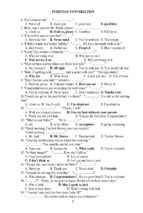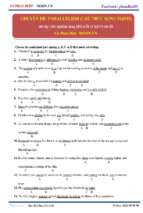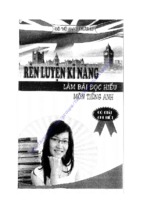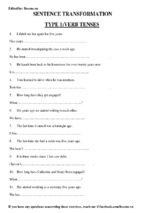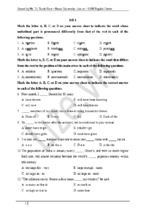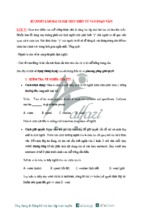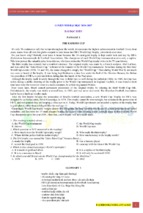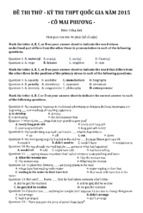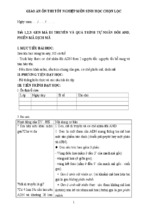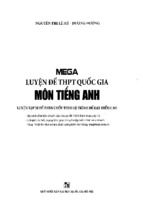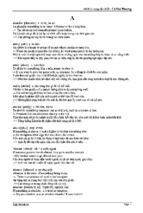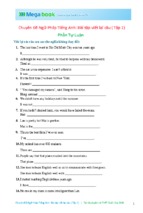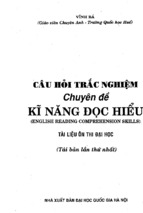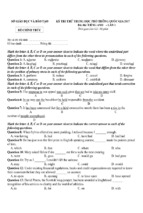HDBM THPT DT
THPT TPCL
ĐỀ THI MẪU - KÌ THI THPT QUỐC GIA 2016
TIME: 90’
I) Choose the word whose underlined part is pronounced differently
1. A. construction B. procedure
C. masterpiece
D. present
2. A. windsurfing
B. wilderness
C. rhino
D. philosopher
II) Choose the word whose stress is different
3. A. kangaroo
B. involvement C. biologist
4. A. parrot
B. reserve
C. vertical
5. A. traveller
B. prevail
C. society
D. accelerate
D. master
D. successful
III) Choose the right word or phrase to complete the sentences
6. More and more trees in the area are found __________ from the effect of polluted air.
A. died
B. to be dying
C. having died
D. to be dead
7. She has ________________ eyes.
A. beautiful, big, blue
B. big, blue, beautiful
C. blue, beautiful, big
D. a blue, beautiful, big
8. Paul was so _________ with his exam results that he didn’t smile all week.
A. satisfying
B. proud
C. delighted
D. disappointed
9. _______________ he arrived at the bus stop when the bus came.
A. No longer has
B. No sooner had C. Not until had
D. Hardly had
10. I ___________ to the author if I thought he would publish the article.
A. write
B. am writing
C. would write
D. had written
11. The children made ___________ a little poem and wrote it in the card.
A. up
B. over
C. for
D. off
12. The higher the content of carbon dioxide in the air, _______________
A. more heat it retains
B. it retains mere heat
C. the more it retains heat
D. the more heat it retains
13. The United States consists of 50 states; _______________ has its own government.
A. each of which B. which
C. that
D. each of them
14. A: “ Our team has just won the last football match?”
B: “ ______________________”.
A. Good idea. Thanks for the news B. Yes. I guess it’s very good
C. Well, that’s very surprising!
D. Yes, it’s our pleasure
15. When I returned, I found that my car ___________ away.
A. had been pulled
B. has been pulled
C. had been pulling
D. has been pulling
16. _______________ I ask him for the money he owes me, he says he will bring it in a few
days, but I don’t think he has got it at all.
A. Whenever
B. However
C. Whatever
D. Wherever
17. There’s no _______________ in going to school if you are not willing to learn
A. reason
B. point
C. aim
D. purpose
18. You _____________ the look on his face when he won the prize.
A. would have seen
B. can be seeing
C. must see
D. should have seen
19. “What do you think of the book?”
“Oh, excellent. It’s worth ____________ a second time”.
A. to read
B. to be read
C. reading
D. being read
20. Nowadays elephants are one of the __________ species in the world. They need protecting.
A. enlightened
B. expensive
C. endangered
D. enlarged
21. Arthur Conan Doyle is the ______ who writes many exciting stories about Sherlock Holmes.
A. teller
B. author
C. editor
D. publisher
22. If you take a good book on your hand, you will find it hard _______________.
A. to pick it up
B. to put it down C. to read it
D. to enjoy it
23. She didn’t get ___________ well with her boss, so the left the company.
A. up
B. at
C. through
D. on
24. A: “Have you been able to reach Peter ?”
B: “___________________________”
A. There’s no approval
B. It’s much too high
C. Yes, I’ve known him for years.
D. No, the line is busy
IV) Choose the alternative which is CLOSEST in meaning to the italicized word
25. The performance thrilled the audience.
A. scene
B. sight
26. They tried hard not to be discontented.
A. discouraged
B. displeased
27. It’s imitation leather.
A. man-made
B. natural
28. They grumbled about the food.
A. argued
B. thought
29. The farmer will harvest the rice soon.
A. gather
B. plant
C. show
D. actor
C. naughty
D. serious
C. valuable
D. expensive
C. complained
D. bargained
C. store
D. visit
V) Choose the underlined word or phrase in each sentence that needs correcting
30. Because of continual moisture and warm, tropical rain forests stay green all year.
A
B
C
D
31. The last person leaves the room must turn off the lights.
A
B
C
D
32. The major goals of primary education is to achieve basic literacy and numeracy among all
A
B C
D
students.
33. Sometimes all it takes is a few minutes to help you and your family
A
B
members feeling more in touch with each other.
C
D
34. Meal time is a great time for family members to talk about that is going
A
B
C
D
on in their lives.
Part VII:. Read the following passages and then choose the best answer for each of the
sentences bellow.
Passage A:
Millions of people are using cell phones today. In many places, it is actually considered
unusual not to use one. In many countries, cell phones are very popular with young people. They find
that the phones are more than a means of communication – having a mobile phone show that they are
cool and connected.
The explosion in mobile phone use around the world has made some health professionals
worried. Some doctors are concerned that in the future many people may suffer health problems from
the use of mobile phones. In England, there has been a serious debate about this issue. Mobile phone
companies are worried about the negative publicity of such ideas. They say that there is no proof
that mobile phones are bad for your health.
On the other hand, medical studies have shown changes in the brain cells of some people who
use mobile phones. Signs of change in the tissues of the brain and head can be detected with modern
scanning equipment. In one case, a travelling salesman had to retire at young age because of serious
memory loss. He couldn’t remember even simple tasks. He would often forget the name of his own
son. This man had to talk on his mobile phone for about six hours a day, every day of his working
week, for a couple of years. His family doctor blamed his mobile phone use, but his employer’s
doctor didn’t agree.
What is it that makes mobile phones potentially harmful? The answer is radiation. High-tech
machines can detect very small amounts of radiation from mobile phones. Mobile phone companies
agree that theories some radiation, but they say the amount is too small to worry about.
As the discussion about their safety continues it appears that it’s best to use mobile phones less
often. Use your regular phone if you want to talk a long time. Use your mobile phone only when you
really need it. Mobile phones can be very useful and convenient, especially in emergencies. In the
future, mobile phones may have a warning label that says they are bad for your health. So for now,
it’s wise not to use your mobile phone too often.
35. According to the passage, cell phone are especially popular with young people because ……….
A. they are indispensable in everyday communication.
B. they make them look more stylist
C. they keep the users alert all the time.
D. they cannot be replace by regular phones.
36. The changes are possibly caused by the cell phones are mainly concerned with ………
A. the mobility of the mind and the body.
B. the smallest unit of the brain
C. the arteries of the brain.
D. the resident memory
37. The word “means” in the passage most closely means ………
A. meanings
B. method
C. expression
D. transmission
38. The word “potentially: in the passage most likely means ………
A. obviously
B. possibly
C. certainly
D. privately
39. The expression “negative publicity” in the passage most likely means ………..
A. information on the lethal effects of cell phones
B. widespread opinion about bad effects of cell phones.
C. the negative public use of cell phones.
D. poor ideas about the effects of cell phones
40. Doctors may tentatively concluded that cell phones may …….
A. damage their user’s emotions
B. cause some mental malfunction
C. change their users’ temperament.
D. change their users’ social behaviors
41. The man mentioned in the passage, who used his cell phone too often, ………
A. suffered serious loss of mental ability.
B. could no longer think lucidly.
C. abandoned his family
D. had a problem with memory.
42. According to the passage, what makes mobile phones potentially harmful is …….
A. their radiant light.
B. their power of attraction
C. their raiding power
D. their invisible rays.
43. According to the writer, people should ……..
A. only use mobile phones in urgent cases.
B. only use mobile phones in medical emergencies.
C. keep off mobile phones regularly.
D. never use mobile phones in all cases.
44. The most suitable title for the passage could be ……..
A. “THE REASON WHY MOBILE PHONES ARE POPULAR”
B. “TECHNOLOGICAL INNOVATION AND THEIR PRICE”
C. “THE WAY MOBILE PHONES WORK”
D. “MOBILE PHONES: A MUST OF OUR TIME’
Passage B:
Traditional in American, helping the poor was a matter for private charities or local
governments. Arriving immigrants depended mainly on predecessors from their homeland to help
them start a new life. In the late 19th and early 20th centuries, several European nations instituted
public-welfare programs. But such a movement was slow to take hold in the United States because
the rapid pace of industrialization and the ready availability of farmland seemed to confirm the belief
that anyone who was willing to work could find a job.
Most of the programs started during the Depression era were temporary relief measures, but
one of the programs – Social Security – has become an American institution. Paid for deductions
from the paychecks of working people, Social Security ensures retired persons receive a modest
monthly income and also unemployment insurance, disability insurance, and other assistance to those
who need it. Social Security payment to retired persons can start at age 62, but many wait until 65,
when the payments are slightly higher. Recently, there has been concern that the Social Security fund
may not have enough money to fulfill its obligations in the 21st century, when the number of eldrly
Americans is expected to increase dramatically. Policy makers have proposed various way to make
up the anticipated deficit, but long term solution is still being debated.
In the year when Roosevelt, other American presidents have established assistant programs.
These include Medicaid and Medicare; food stamps, certificates that people can use to purchase food;
and public housing which is used at federal expense and made available to persons on low incomes.
Needy American can also turn to sources other than the government for help. A broad
spectrum of private charities and voluntary organizations is available. Volunteerism is on the rise in
the United States, especially retired persons. It is estimated that almost 50% of Americans over age
18 do volunteer work, and 70% of U.S households contribute to charity.
45. New immigrants to the U.S can seek help from …..
A. the people who came earlier.
B. the U.S government agencies.
C. only charity organizations
D. volunteer organizations
46. It took welfare programs a long time to gain a foothold in the U.S due to the fast growth of …
A. industrialization B. modernization C. urbanization
D. population
47. The word “instituted” in the first paragraph mostly means ………
A. executed
B. studied
C. introduced
D. enforced
48. The Social Security program has become possible thanks to ………
A. deductions from wages
B. people’s willingness to work
C. donations from companies
D. enforcement laws
49. Most of public assistance programs ………… after the severe economic crisis.
A. were introduced into institutions
B. did not become institutionalized
C. functioned fruitfully in institutions. D. did not work in institutions
50. That Social Security payments will be a burden comes from the concern that ………
A. elderly people ask for more money.
B. the program discourages working people
C. the number of elderly people grows
D. younger people do not want to work
51. Low income people can access public housing through …………
A. low rents
B. state spending
C. donations
D. federal expenditure
52. Americans on low incomes can seek help from …….
A. federal government
B. government agencies
C. state government
D. non-government agencies
53. Public assistance has become more and more popular due to the ………..
A. young people’s volunteerism only
B. volunteer organizations
C. people’s growing in commitment to charity
D. innovations in the tax system
54. The passage mainly discusses ……….
A. public assistance in America
B. immigration into America
C. funding agencies in America
D. ways of fund-raising in America.
Fill in each numbered blank with one suitable word or phrase.
Children in (55) _____ Netherlands must be at least four years old to (56) _____ primary
education. Almost all 4-year-olds (99.3%) in the country indeed attend primary school, (57) _____
this is not compulsory until children reach the age (58) _____ 5. Primary school is free of charge. In
most schools, children are grouped by (59) _____ in mixed ability classes, with one teacher for all
subjects. Primary school (60) _____ of 8 groups, thus schooling (61) _____ for 8 years. During the
first two years, which (62) _____ kindergarten, children receive an average of 22 hours of (63)
_____, during the last 6 years children receive an average of 25 hours per week. Schools are open 5
days a week, but children are free on Wednesday afternoon. At the end of primary school, or in group
8, schools advice on secondary school choice. Most schools use a national test to support this advice,
for instance the 'Citotoets’, a test (64) ____ by the Central Institute for Test development.
55. a. a
56. a. afford
57. a. although
58. a. of
59. a. old
60 a. includes
61. a. spends
62. a. also called
63. a. educate
64. a. develop
b. an
b. enter
b. despite
b. on
b. elderly
b. contains
b. lasts
b. is also called
b. educative
b. to develop
c. the
c. come
c. in spite
c. in
c. aging
c. consists
c. lengthens
c. is called also
c. educator
c. developed
d. Ø
d. run
d. due to
d. for
d. age
d. composes
d. takes
d. is also calling
d. education
d. developing
VIII) Finish each of the following sentences in such a way that it means the same as the
sentence printed before it.
65. “Do you believe in what the boy says, Mary?” said Tom.
- Tom asked ...........................................................................................................
66. John is fat because he eats so many chips.
- If ..........................................................................................................................
67. People say he won a lot of money on the lottery.
- He is .....................................................................................................................
68. He was very tired but he kept on working.
- Although ..............................................................................................................
69. Most of Ann’s friends work less hard than her.
Ann works ..............................................................................................................
Part IX: Should school violence be punished strictly ? In about 140 words, write a paragraph to
state your opinion.
…………………………………………………………………………………………………………
…………………………………………………………………………………………………………
…………………………………………………………………………………………………………
…………………………………………………………………………………………………………
…………………………………………………………………………………………………………
…………………………………………………………………………………………………………
…………………………………………………………………………………………………………
…………………………………………………………………………………………………………
…………………………………………………………………………………………………………
…………………………………………………………………………………………………………
…………………………………………………………………………………………………………
…………………………………………………………………………………………………………
…………………………………………………………………………………………………………
…………………………………………………………………………………………………………
…………………………………………………………………………………………………………
…………………………………………………………………………………………………………
…………………………………………………………………………………………………………
…………………………………………………………………………………………………………
…………………………………………………………………………………………………………
…………………………………………………………………………………………………………
…………………………………………………………………………………………………………
…………………………………………………………………………………………………………
…………………………………………………………………………………………………………
…………………………………………………………………………………………………………
…………………………………………………………………………………………………………
…………………………………………………………………………………………………………
…………………………………………………………………………………………………………
…………………………………………………………………………………………………………
…………………………………………………………………………………………………………
…………………………………………………………………………………………………………
…………………………………………………………………………………………………………
………………………………………………………………………………………………………
== o0o ==
ĐÁP ÁN
PHẦN TRẮC NGHIỆM:
1. D
9. D
17. B
25. C
33. C
41. D
49. B
57. A
2. C
10. C
18. D
26. B
34. C
42. D
50. C
58. A
3. A
11. A
19. C
27. A
35. C
43. A
51. D
59. D
4. B
12. D
20. C
28. C
36. D
44. D
52. D
60. C
5. A
13. A
21. B
29. A
37. C
45. A
53. B
61. B
6. B
14. C
22. B
30. B
38. B
46. A
54. A
62. B
7. A
15. A
23. D
31. B
39. B
47. D
55. C
63. D
8. D
16. A
24. D
32. B
40. B
48. A
56. B
64. C
PHẦN TỰ LUẬN:
1. Tom asked Mary if she believed in what the boy said.
2. If John didn’t eat so many chips, he would not be fat.
3. He is said to have won a lot of money on the lottery.
4. Although he was very tired, he kept on working.
5. Ann works harder than most of her friends do.
SỞ GIÁO DỤC ĐÀO TẠO
HỘI ĐỒNG BỘ MÔN TIẾNG ANH THPT
ĐỀ THI MẪU – KỲ THI THPT QUỐC GIA 2016
Thời gian làm bài: 90 phút
Đơn vị: THPT Chuyên Nguyễn Quang Diêu
Đề thi cấu trúc 3
SECTION A: MULTIPLE CHOICES
Choose the letter A, B, C, or D to indicate the word whose underlined part is PRONOUNCED
differently from the other three in each of the following questions.
Question 1: A. advisedly
B. demanded
C. prevented
D. cured
Question 2: A. collect
B. operate
C. hobby
D. volunteer
Choose the letter A, B, C, or D to indicate the word that differs from the other three in the
position of the PRIMARY STRESS in each of the following questions.
Question 3: A. technique
B. advance
C. challenge
D. attempt
Question 4: A. catastrophe
B. emergency
C. fundamental
D. solidify
Question 5: A. compulsory B. engineering
C. ridiculous
D. industrial
Read the following passage and mark the letter A, B, C, or D on your answer sheet to indicate
the correct answer for each of the questions from 6 to 15.
A fold culture is small, isolated, cohesive, conservative, nearly self-sufficient group that is
homogeneous in custom and race, with a strong family or clan structure and highly developed
rituals.
Order is maintained through sanctions based in the religion or family, and interpersonal
relationships are strong. Tradition is paramount, and change comes infrequently and slowly. There
is relatively little division of labor into specialized duties. Rather, each person is expected to
perform a great variety of tasks, though duties may differ between the sexes. Most goods are
handmade, and a subsistence economy prevails. Individualism is weakly developed in folk cultures,
as are social classes. Unaltered folk cultures no longer exist in industrialized countries such as the
United States and Canada. Perhaps the nearest modern equivalent in Anglo-America is the Amish,
a German American farming sect that largely renounces the products and labor saving devices of
the industrial age. In Amish areas, horse-drawn buggies till serve as a local transportation device,
and the faithful are not permitted to own automobiles.
The Amish’s central religious concept of Demut, “humility”, clearly reflects the weakness of
individualism and social class so typical of folk cultures, and there is a corresponding strength of
Amish group identity. Rarely do the Amish marry outside their sect. The religion, a variety of the
Mennonite faith, provides the principal mechanism for maintaining order.
By contrast, a popular culture is a large heterogeneous group, often highly individualistic and
constantly changing. Relationships tend to be impersonal, and a pronounced division of labor
exists, leading to the establishment of many specialized professions. Secular institutions, of control
such as the police and army take the place of religion and family in maintaining order, and a
money-based economy prevails. Because of these contrasts, “popular” may be viewed as clearly
different from “folk”.
The popular is replacing the folk in industrialized countries and in many developing nations, Folkmade objects give way to their popular equivalent, usually because the popular item is more
quickly or cheaply produced, is easier or time saving to use, or lends more prestige to the owner.
Question 6: What does the passage mainly discuss?
A. Two decades in modern society
B. The influence of industrial technology
C. The characteristics of “folk” and “popular” societies
D. The specialization of labor in Canada and the United States
Question 7: The word “homogeneous” is closest in meaning to _________.
A. uniform
B. general
C. primitive
D. traditional
Question 8: Which of the following is typical of folk cultures?
A. There is a money-based economy.
B. Social change occurs slowly.
C. Contact with other cultures is encouraged. D. Each person develops one specialized skill.
Question 9: What does the author imply about the United States and Canada?
A. They value folk cultures.
B. They have no social classes.
C. They have popular cultures.
D. They do not value individualism.
Question 10: The phrase “largely renounces” is closest in meaning to _________.
A. generally rejects
B. greatly modifies C. loudly declares D. often criticizes
Question 11: What is the main source of order in Amish society?
A. The government
B. The economy
C. The clan structureD. The religion
Question 12: Which of the following statements about Amish beliefs does the passage support?
A. A variety of religious practices is tolerated. B. Individualism and competition are important.
C. Pre-modern technology is preferred.
D. People are defined according to their class.
Question 13: Which of the following would probably NOT be found in a folk culture?
A. A carpenter
B. A farmer
C. A weaver
D. A banker
Question 14: The word “prevails” is closest in meaning to _________.
A. dominates
B. provides
C. develops
D. invests
Question 15: Which of following is NOT given as a reason why folk-made objects are replaced by
mass-produced objects?
A. cost
B. prestige
C. quality
D. convenience
Choose the letter A, B, C or D to indicate the correct answer to each of the following questions.
Question 16: It’s getting too hot and stuffy in here. Would you mind my _______ the windows?
A. open
B. to open
C. being opened
D. opening
Question 17: Another satellite, Vina-sat2, ________ up into space by Viet Nam recently.
A. has been sent
B. has sent
C. sent
D. was sent
Question 18: Little Jimmy is very much keen ________ manga and story books.
A. for
B. on
C. at
D. in
Question 19: Because of his reaction, the problem became ________ than we had thought.
A. a lot more complicated
B. so much complicated
C. much less far complicated
D. more a bit complicated
Question 20: As humans keep cutting down forests, more and more wild animals are _______
threat _______ n extinction.
A. at - of
B. on - with
C. under - of
D. in - with
Question 21: If there _______ some restaurants near the hotel, the tourists would not have to take
taxis.
A. were
B. was
C. will be
D. would be
Question 22: He always did well at school _______ having his early education disrupted by
illness.
A. on account of
B. in spite of
C. in addition to
D. even though
Question 23: The fire caused _______ damage that the factory building had to be demolished.
A. so much
B. too much
C. such much
D. very much
Question 24: ________ the fifth largest among the nine planets that make up our solar system is
not surprising to me.
A. The Earth being
B. The Earth is
C. That the Earth is D. Being the Earth
Question 25: ________, women are responsible for the chores in the house and taking care of the
children.
A. With tradition
B. On tradition
C. Traditional
D. Traditionally
Question 26: What chemical is this? It is ______ a horrible smell.
A. giving down
B. giving off
C. giving up
D. giving out
Question 27: Judy: “Don’t fail to send your parents my regards.” -Jenny: “___________”
A. You’re welcome
B. Good idea, thanks
C. Thanks, I will D. It’s my pleasure
Question 28: Would you mind ________ me a favour and posting this letter for me?
A. making
B. doing
C. getting
D. giving
Question 29: He found______ to answer all the questions within the time given.
A. that impossible
B. that impossibly C. it impossibly
D. it impossible
Question 30: Only when he arrived at the airport ________ that he had left his passport home.
A. did he realize
B. he realized
C. had he realized D. he was realized
Question 31: We are up to our ________ in paperwork and don’t have a bit of free time for
entertainment these days.
A. neck
B. forehead
C. chest
D. shoulders
Question 32: The lecturer explained the problem very clearly and is always _______ in response to
questions.
A. attention
B. attentively
C. attentive
D. attentiveness
Question 33: The girl _____ is my new neighbor.
A. talks to the lady over there.
B. is talking to the lady over there
C. talking to the lady over there
D. was talking to the lady over there
Question 34: Steven: “I’m sorry. I left my guitar home.” _Jefferson: “_________.”
A. Well. You do? I’m sorry.
B. Oh. What a pity for that.
C. Never mind. I’ve got another one.
D. No way. It’s up to you.
Read the following passage and mark the letter A, B, C, or D on your answer sheet to indicate
the correct answer to each of the questions from 35 to 44.
In the West, cartoons are used chiefly to make people laugh. The important feature of all these
cartoons is the joke and the element of surprise which is contained. Even though it is very funny, a
good cartoon is always based on close observation of a particular feature of life and usually has a
serious purpose.
Cartoons in the West have been associated with political and social matters for many years. In
wartime, for example, they proved to be an excellent way of spreading propaganda. Nowadays
cartoons are often used to make short, sharp comments on politics and governments as well as on a
variety of social matters. In this way, the modern cartoon has become a very powerful force in
influencing people in Europe and the United States.
Unlike most American and European cartoons, however, many Chinese cartoon drawings in the
past have also attempted to educate people, especially those who could not read and write. Such
cartoons about the lives and sayings of great men in China have proved extremely useful in
bringing education to illiterate and semi-literate people throughout China. Confucius, Mencius and
Laozi have all appeared in very interesting stories presented in the form of cartoons. The cartoons
themselves have thus served to illustrate the teachings of the Chinese sages in a very attractive
way.
In this sense, many Chinese cartoons are different from Western cartoons in so far as they do not
depend chiefly on telling jokes. Often, there is nothing to laugh at when you see Chinese cartoons.
This is not their primary aim. In addition to commenting on serious political and social matters,
Chinese cartoons have aimed at spreading the traditional Chinese thoughts and culture as widely as
possible among the people.
Today, however, Chinese cartoons have an added part to play in spreading knowledge. They offer a
very attractive and useful way of reaching people throughout the world, regardless of the particular
country in which they live. Thus, through cartoons, the thoughts and teachings of the old Chinese
philosophers and sages can now reach people who live in such countries as Britain, France,
America, Japan, Malaysia or Australia and who are unfamiliar with the Chinese culture.
Until recently, the transfer of knowledge and culture has been overwhelmingly from the West to
the East and not vice versa. By means of cartoons, however, publishing companies in Taiwan,
Hong Kong and Singapore are now having success in correcting this imbalance between the East
and the West.
Cartoons can overcome language barriers in all foreign countries. The vast increase in the
popularity of these cartoons serves to illustrate the truth of Confucius’s famous saying “One picture
is worth a thousand words.”
Question 35: Which of the following clearly characterizes Western cartoons?
A. Enjoyment, liveliness, and carefulness.
B. Seriousness, propaganda, and attractiveness.
C. Humour, unexpectedness, and criticism. D. Originality, freshness, and astonishment.
Question 36: Chinese cartoons have been useful as an important means of _________.
A. educating ordinary people
B. spreading Western ideas
C. amusing people all the time
D. political propaganda in wartime
Question 37: The major differences between Chinese cartoons and Western cartoons come from
their _________.
A. purposes
B. nationalities
C. values
D. styles
Question 38: The pronoun “this” in paragraph 4 mostly refers to_________.
A. a piece of art
B. an educational purpose
C. a funny element
D. a propaganda campaign
Question 39: The passage is intended to present_________.
A. a contrast between Western cartoons and Chinese cartoons
B. a description of cartoons of all kinds the world over
C. an outline of Western cartoons and Chinese cartoons
D. an opinion about how cartoons entertain people
Question 40: Which of the following could be the best title for the passage?
A. Chinese Cartoons and Western Cartoons
B. A Very Powerful Force in Influencing People
C. An Excellent Way of Spreading Propaganda
D. Cartoons as a Way of Educating People
Question 41: In general, Chinese cartoons are now aiming at _________.
A. bringing education to illiterate and semi-literate people in the world
B. disseminating traditional practices in China and throughout the world
C. illustrating the truth of Chinese great men’s famous sayings
D. spreading the Chinese ideas and cultural values throughout the world
Question 42: The word “imbalance” in paragraph 6 refers to _________.
A. the mismatch between the East cartoons and the West cartoons
B. the dominant cultural influence of the West over the East
C. the influence of the East cartoons over the West cartoons
D. the discrimination between the West culture and the East culture
Question 43: Which of the following is most likely the traditional subject of Chinese cartoons?
A. Jokes and other kinds of humour in political and social matters.
B. The philosophies and sayings of ancient Chinese thinkers.
C. The illiterate and semi-literate people throughout China.
D. The stories and features of the lives of great men the world over.
Question 44: According to the passage, which of the following is true?
A. Western cartoons always have a serious purpose. B. Language barriers restricted cartoons.
C. Cartoons will replace other forms of writing.
D. Cartoons can serve various purposes.
Choose the letter A, B, C, or D to indicate the underlined part that needs correction.
Question 45: Dictionaries frequently explain the origin of the defined word, state its part of speech and
A
B
C
indication its correct use.
D
Question 46: Publishing in the U.K, the book has won a number of awards in the recent regional book
A
B
C
D
fairs.
Question 47: My father is very busy with his business; therefore , he is always willing to give
A
B
C
a hand with the housework.
D
Question 48: In most of high schools in that region, children must wear a uniform as required by
A
B
C
D
the city council.
Question 49: He has recently been offered a great job working as an electric engineer for that
A
B
C
D
prestigious car company.
Choose the letter A, B, C or D to indicate the word or phrase that is CLOSEST in meaning to the
underlined part in each of the following questions.
Question 50: The repeated commercials on TV distract many viewers from watching their favorite
films.
A. business
B. advertisements
C. economics
D. contests
Question 51: Some land is best used if two or more different kinds of crops are grown on it
alternately; on the other hand, it is better to grow the same crop continuously.
A. time after time
B. slowly but surely
C. one after another
D. for many years
Question 52: You may find that jogging is detrimental to your health rather than beneficial.
A. useful
B. facile
C. depressing
D. harmful
Question 53: For a decade, Barzilai has studied centenarians, looking for genes that contribute to
longevity.
A. who are vegetarians
B. who want to be fruitarians
C. who are extraordinary
D. who live to be 100 and above
Question 54: The mountain region of the country is thinly populated.
A. sparsely
B. densely
C. greatly
D. fully
Choose the letter A, B, C, or D to indicate the correct word for each of the blanks from 55 to 64.
When the word "endangered" is mentioned, people usually think of particular species, like the
panda or whooping crane. However, we would like to encourage you to think about (55) _______
in a broader context. It is (56) _______, the physical places where species live and interact with
one another. Although the development of special breeding programs, also known as captive
conservation, may help some species in some cases, it is clearly not (57) _______ answer to the
global problem. Indeed, (58) _______ we are able to protect natural areas where endangered
species actually live, they have no future.
Species become endangered for a wide (59) ________ of reasons. By analyzing and grouping many
individual cases, however, we find the same broad causes (60) _________ again and again. They
are Habitat Destruction, Exotic Species, and Overexploitation. Among other factors threatening
particular species are limited: distribution, disease, and pollution. Limited distributions are often a
consequence of other threats: populations confined to one or a few small areas because of habitat
(61) _________, for example, may be disastrously affected by random factors. Diseases can have
severe (62) _________ on species lacking natural genetic protections against particular pathogens,
like the rabies and canine distemper viruses that are currently devastating carnivore populations in
East Africa. Domestic animals are usually the reservoirs of these and other diseases affecting wild
(63) _________, showing once again that human activities lie at the root of most causes of
endangerment. Pollution has seriously done harm (64) _________ number of terrestrial species,
although species living in freshwater and marine ecosystems are also suffering.
Question 55:
Question 56:
Question 57:
Question 58:
Question 59:
Question 60:
Question 61:
Question 62:
Question 63:
Question 64:
A. development
A. plants
A. a
A. so
A. variety
A. expressing
A. benefit
A. impact
A. needs
A. to
B. endangerment
B. conservations
B. an
B. but
B. commerce
B. showing
B. reserve
B. interest
B. populations
B. for
C. pollution
C. habitats
C. the
C. if
C. extinction
C. disappearing
C. loss
C. infection
C. natures
C. with
D. contamination
D. organizations
D. this
D. unless
D. destruction
D. appearing
D. gone
D. absorption
D. medicines
D. at
SECTION B: WRITING
PART I: Finish each of the following sentences in such a way that the rewritten sentence has
the same meaning to the original one.
Question 65: The last time I went to that town was ten years ago.
It ..........................................................................................................................................................
Question 66: “I’m sorry, Jackie. I didn’t tell you the problem earlier,” said Steven.
Steven apologized to ..........................................................................................................................
Question 67: It was such a beautiful creature that everyone stopped to have a look.
So .......................................................................................................................................................
Question 68: It’s very much relaxing for Jenny to listen to this wonderful type of music.
Jenny thinks it ....................................................................................................................................
Question 69: That boy gets more depressed when the weather becomes hotter.
The hotter ...........................................................................................................................................
PART II: In about 140 words, write a paragraph on one of the following topics:
1/. Measures to protect endangered animals.
2/. Women’s roles in modern society have been changing over the past few decades.
............................................................................................................................................................
............................................................................................................................................................
............................................................................................................................................................
............................................................................................................................................................
............................................................................................................................................................
............................................................................................................................................................
............................................................................................................................................................
............................................................................................................................................................
............................................................................................................................................................
............................................................................................................................................................
............................................................................................................................................................
............................................................................................................................................................
THE END.
Giáo viên: Lê Xuân Hồ
ANSWER KEYS
SECTION A: MULTIPLE CHOICES
1
2
3
4
5
6
7
8
D
A
C
C
B
C
A
B
9
10
11
12
13
14
15
16
C
A
D
C
D
A
C
D
17
18
19
20
21
22
23
24
A
B
A
C
A
B
A
C
25
26
27
28
29
30
31
32
D
B
C
B
D
A
A
C
33
34
35
36
37
38
39
40
C
C
C
A
A
C
A
A
41
42
43
44
45
46
47
48
D
B
B
D
D
A
B
A
49
50
51
52
53
54
55
56
D
B
C
D
D
A
B
C
57
58
59
60
61
62
63
64
B
D
A
D
C
A
B
A
SECTION B: WRITING
PART I:
Question 65: The last time I went to that town was ten years ago.
It is/has been ten years since I last went to that town. ......................................................................
Question 66: “I’m sorry, Jackie. I didn’t tell you the problem earlier,” said Steven.
Steven apologized to Jackie for not telling him the problem earlier. ...............................................
Question 67: It was such a beautiful creature that everyone stopped to have a look.
So beautiful was the creature that everyone stopped to have a look. ...............................................
Question 68: It’s very much relaxing for Jenny to listen to this wonderful type of music.
Jenny thinks it very much relaxing to listen to this wonderful type of music. ...................................
Question 69: That boy gets more depressed when the weather becomes hotter.
The hotter the weather [becomes], the more depressed the boy gets. ...............................................
PART II: Theo hướng dẫn của đề thi minh hoạ.
HẾT.
Sở GDĐT Đồng Tháp
Đơn vị: Trường THPT Phú Điền
ĐỀ THI THỬ KỲ THI THPT QUỐC GIA
NĂM 2016 – ĐỀ CẤU TRÚC 2
Môn: TIẾNG ANH
Thời gian làm bài: 90 phút, không kể thời gian phát đề
Mark the letter A, B, C, or D on your answer sheet to indicate the word whose underlined
part is pronounced differently from that of the rest.
1. A. friendly
B. religion
C. tent
D. correct
2. A. population
B. hope
C. compose
D. control
Choose the word whose main stress is placed differently from that of the rest
3. A. certificate
B. apartment
C. individual
D. biology
4. A. interview
B. shortage
C. applicant
D. supportive
5. A. irrigate
B. cosmetic
C. ancestry
D. delicate
Mark the letter A, B, C, or D on your answer sheet to indicate the correct answer to each of
the following question.
6. We ______ out as soon as it ________ raining?
A. go/ will stop
B. will go/ stops
C. will go/ is stopping
D. go/will have stopped
7. Margaret did not remember what I _________her the day before.
A. would tell
B. had told
C. had been telling D. had been told
8. I am really __________in the way he talks, but the way he behaves.
A. excited
B. interested
C. keened
D. fond
9. I have lost my umbrella. I__________it on the bus.
A. should have left B. can leave
C. could leave
D. must have left
10. Are you getting ______well at college?
A. on
B. off
C. in
D. over
11. “I _________to see the doctor if I were you.”
A. was to go
B. had gone
C. would go
D. would be going
12. The boys proposed that their group leader.................. a camping trip.
A. organized
B. organize
C. organizes
D. organizing
13. _______ in Rome than he was kidnapped.
A. No sooner he arrived
B. Had he no sooner arrived
C. No sooner had he arrived
D. No sooner he had arrived
14. He stopped working because he was too tired
A. because of his tiredness
B. since being tired
C. for tired
D. although his tiredness
15. I didn’t get the job ____________ I had all the necessary qualifications
A. because
B. because of
C. although
D. despite
16. Living in the city is getting__________.
A. the more expensive and expensive
B. more expensive and more expensive
C. expensive and expensive
D. more and more expensive
17. She applied for training as a pilot, but they turned her ______because of her poor eyesight.
A. back
B. up
C. over
D. down
18. She seemed quite interested in buying that house, but at the last moment, she changed her _____
A. mind
B. thoughts
C. offer
D. opinion
19. My grandfather was a ______ smoker, so few people were surprised when he died of oral
cancer.
A. serial
B. heavy
C. big
D. serious
20. She was a / an ______ wife who loved her husband more than anything else in the whole
universe.
A. devoted
B. sincere
C. intelligent
D. caring
21. Different conservation efforts have been made in order to save _______ species.
A. endangered
B. danger
C. dangerous
D. endanger
22. Another conversation effort is the development of wildlife habitat reserves as they are suitable
for their _______.
A. surviving
B. survival
C. survivor
D. survive
23. Professor Berg was very interested in the diversity of cultures all over the world.
A. variety
B. changes
C. conservation
D. number.
24. We are very anxious about the result of the exam.
A. worried
B. careful
C. excited
D. careless
25. She usually spends one hour driving to work every day.
A. She usually works one hour every day.
B. It usually takes her one hour to drive to work every day.
C. She usually goes to work by car once a day.
D. It usually takes her one hour to work on her car everyday.
26. I’d rather be hungry than eat that food.
A. I am hungry and I want to eat that food.
B. I can’t stand being hungry so I’ll eat that food.
C. I am hungry enough to eat that food.
D. I prefer being hungry to eating that food.
27. There are many factors contributing to air pollution.
A. Air pollution results in many consequences.
B. Air pollution is contributing to these phenomena.
C. Air pollution is the result of burning forests.
D. Factors contributing to air pollution are numerous.
28. “I’ve enjoyed myself very much. But it’s very late, so _________.”
A. take good care
B. have a good day
C. goodbye for now
D. it’s great fun, thanks
29. – Mike: “Our living standards have been improved greatly.” – Susan: “_________.”
A. Thank you for saying so
B. Sure. I couldn’t agree more
C. No, it’s nice to say so
D. Yes, it’s nice of you to say so
Mark the letter A, B, C or D on your answer sheet to show the underlined part that needs
correction in each of the following questions.
30. (A) The very first night I (B) was in Australia, I (C) couldn't have slept until early (D) in the
morning.
31. I (A) didn’t see Marry since she (B) went (C) to live in (D) the capital
32. It (A) was in this school (B) where I studied (C) when I was (D) a little girl.
33. The meeting was so (A) length that (B) many people had (C) to leave before it (D) ended.
34. (A) Follow vaporisation, a (B) reduction in temperature will (C) result in (D) condensation.
Read the following passage and mark the letter A, B, C or D on your answer sheet to indicate
the correct word or phrase that best fits each of the numbered blanks.
Widespread doubt about women’s intellectual ability led most societies to deny
……35……., employment and many legal and political rights to women. It was men …36……..
controlled most positions of employment and power in society.
The struggle …37……. women’s rights – the rights that …38…….. the same social,
economic, and political status for women as for men – began in the 18th century during a period
known as the Age of Enlightenment. Duuring this period, ……39….. philosophers in Europe began
to argue that all individuals, male or female, were born with natural ……40….. that made them free
and equal. These pioneer thinkers advocated that women should not be discriminated against on the
……41… of their sex.
Today, although their status ……42….. in different countries, women in most parts of the
world have gained ……43….. legal rights. The most important of these are: the right to have equal
work opportunities and pay to men, the right to vote, and the right ……44….. formal education.
35. A. education
B. educated
C. educating
D. educational
36. A. which
B. where
C. who
D. whose
37. A. of
B. against
C. for
D. to
38. A. has
B. establish
C. improve
D. change
39. A. political
B. politic
C. politics
D. politicized
40. A. rights
B. authority
C. power
D. influence
41. A. fact
B. matter
C. basis
D. basic
42. A. changes
B. tranforms
C. alters
D. varies
43. A. signified
B. significance
C. significantly
D. significant
44. A. at
B. to
C. for
D. in
Read the following passage and mark the letter A, B, C or D on your answer sheet to indicate
the correct answer to each of the questions.
Pandemic (dịch bệnh)
Diseases are a natural part of life on Earth. If there were no diseases, the population would grow too
quickly, and there would not be enough food or other resources. So in a way, diseases are nature's
way of keeping the Earth in balance. But sometimes they spread very quickly and kill large
numbers of people. For example, in 1918, an outbreak of the flu spread across the world, killing
over 25 million people in only six months. Such terrible outbreaks of a disease are called
pandemics.
Pandemics happen when a disease changes in a way that our bodies are not prepared to fight. In
1918, a new type of flu virus appeared. Our bodies had no way to fight this new flu virus, and so it
spread very quickly and killed large numbers of people. While there have been many different
pandemic diseases throughout history, all of them have a few things in common.
First, all pandemic diseases spread from one person to another very easily. Second, while they may
kill many people, they generally do not kill people very quickly. A good example of this would be
the Marburg virus. The Marburg virus is an extremely infectious disease. In addition, it is deadly.
About 70-80% of all the people who get the Marburg virus die from the disease. However, the
Marburg virus has not become a pandemic because most people die within three days of getting the
disease. This means that the virus does not have enough time to spread to a large number of people.
The flu virus of 1918, on the other hand, generally took about a week to ten days to kill its victims,
so it had more time to spread.
While we may never be able to completely stop pandemics, we can make them less common.
Doctors carefully monitor new diseases that they fear could become pandemics. For example, in
2002 and 2003, doctors carefully watched SARS. Their health warnings may have prevented SARS
from becoming a pandemic.
45. This passage is mainly about ____.
A. how to prevent pandemic diseases.
B. pandemic diseases.
C. pandemic diseases throughout history. D. why pandemics happen.
46. According to paragraph 1, how are diseases a natural part of life on Earth?
A. They prevent pandemics.
B. They help control the population.
C. They help the world grow quickly.
D. They kill too many people.
47. Based on the information in the passage the term pandemics can best be explained as ___.
A. diseases with no cure
B. diseases that spread quickly and kill large numbers of people
C. a deadly kind of flu
D. new diseases like SARS or the Marburg virus
48. According to the passage, what causes pandemics?
A. Changes in a disease that the body cannot fight
B. Careless doctors who do not watch the spread of diseases
C. Population growth that the world cannot support
D. The failure to make new medicines
49. According to the passage, all of the following are true of the 1918 flu pandemic EXCEPT that
____.
A. it involved a new kind of flu virus
B. it killed over 25 million people
C. it was the last pandemic in history
D. it took a little over a week to kill its victims
50. The word it in the passage refers to ____.
A. disease
B. flu virus
C. pandemics
D. bodies
51. Which of the following is mentioned as a common feature of all pandemic diseases?
A. They spread from people to people very slowly.
B. They may kill many people very quickly.
C. They do not kill people very quickly.
D. They kill all the victims.
52. According to paragraph 3, why hasn't Marburg virus become a pandemic?
A. It is not a deadly disease.
B. It does not spread from person to person easily.
C. Doctors have prevented it from becoming a pandemic.
D. It kills people too quickly.
53. The word monitor in the passage is closest in meaning to ____.
A. fight
B. prevent
C. watch
D. avoid
54. The author mentions SARS in order to ____.
A. give an example of a highly dangerous disease.
B. suggest that SARS will never become a pandemic.
C. give an example of the successful prevention of a pandemic.
D. suggest that there may be a new pandemic soon.
Read the following passage and mark the letter A, B, C or D on your answer sheet to indicate
the correct answer to each of the questions.
What I love about my job is the variety. I get enquiries (việc điều tra) from people all over
the world asking me how they should go about setting up their own website. I’ve been asked about
so many subjects - anything from someone wanting to teach people how to throw boomerangs to
another people selling paper flowers which they make at home in their spare time.
Obviously with all the thousands of websites available at the click of a button, you want to
create an impression with your website so that it becomes a must-see destination. Not everyone is
prepared, however, for the way in which a website can become so popular that it actually has to be
closed down.
When people first set up their websites they probably pay their web advertiser a monthly fee
based on the number of hits (visitors) or page impressions their site receives. If they can pay their
monthly fee without it costing them too much, that is the best that most people hope for. One guy,
Pete Bennett, whom I helped, wanted to set up a one-stop shop to provide decent images of the
world’s flags. He’d been fascinated by flags since his boyhood and had no idea that thousands of
other people share his passion. Anyway, in one month his web page had over 1.5 million hits. As a
result his internet provider trebled (gấp 3) the fee that he was being charged. He wasn’t a rich
person and he couldn’t afford to spend that amount of money on a hobby without any benefit to
him, so he decided to carry advertising on his site. He found a company which specializes in
smaller sites and adverts were added to the pages on his website. So, although he doesn’t make a
huge profit, at least his hobby provides him with a small income.
If you have specialist skills or expertise, it can pay you to sell the products that people want.
I helped one woman design a page to advertise the fact that she tells fortunes, based on the
information that her clients supply her with. If you want her to tell your fortune, you fill in a
questionnaire online -- your age, date of birth, hobbies, interests and so on and for a small fee she emails you back your fortune. You can print it out and it looks really good, decorated with moons
and stars, your zodiac (hoàng đạo) sign and your birthstone. I tried it myself and although I’m not
sure I believe it, my future according to her is positive and exciting. I also found out that for
someone born in August, like me, the birthstone is a peridot (đá/ngọc peridot), a pale green stone
which I’d never even heard of!
I also get a fair number of complaints from people e-mailing me to say that they can’t access
the website. When they click on the site a message appears on their screen saying ‘An error has
occurred in the script (bản chính) on this page’. This usually happens when someone has tried to
achieve fancy effects on their website by using programming techniques based on a scripting
language. This means that unless they really know what they are doing, whoever designed the site
has probably made a mistake in their programming. This is where people like me come in. Most
computer instruction guides make things appear quite straightforward, but unless you’re very
skilled, you’re likely to run into problems. It’s generally worth getting a professional to help you set
up your site in the first place -- otherwise people like me would be out of work. And let’s face it,
this is big business.
55. What does Paul Howells enjoy most about his job?
A. Dealing with different people.
B. His worldwide contacts.
C. Teaching design skills.
D. The range of topics.
56. What does Paul mean by ‘a must-see destination’ in paragraph 2?
A. A website that can no longer be seen
B. A website that everyone wants to visit
C. A website that does not make a charge
D. A website that has been well prepared
57. Why did Pete Bennett set up a website on flags?
A. He knew lots of people shared his interest.
B. He hoped to make a lot of money.
C. A web advertiser wanted to sell flags.
D. He’d been interested in flags for years.
58. What word can best replace the word “hits” in paragraph 3?
A. bad effects
B. beats
C. attacks
D. visits
59. Why did Pete Bennett accept advertising on his website?
A. To attract more hits.
B. To repay the huge fee.
C. To add more interest.
D. To help him earn some money.
60. Who are the “clients” in paragraph 4 referred to?
A. Interested people
B. Web page designers
C. Internet providers
D. Product advertisers
61. Why do error messages sometimes appear?
A. People make a mistake in their e-mail address.
B. People try to put too much on the web page.
C. People have used a program incorrectly.
D. People have clicked on the wrong button.
62. What comment does Paul make about setting up a website?
A. It is usually fairly easy to do.
B. You must use a good instruction guide.
C. It can be quite complicated.
D. You should rely on your own skills.
63. What word can best replace the word “script” in paragraph 5?
A. instruction
B. picture
C. handwriting
D. play
64. What does Paul’s final sentence suggest about his work?
A. There’s a lot of money to be made in designing websites.
B. There are far too many websites on the internet.
C. There’s a big chance of becoming unemployed.
D. There are more web page designers than necessary.
Writing:
Part 1: Finish each of the following sentences in such a way that it means the same as the
sentence printed before it.
- Xem thêm -

